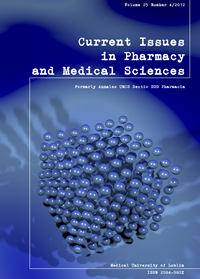The effect of prolonged incubation time on the interaction between PAMAM dendrimers and iminodiacetic acid derivatives
DOI:
https://doi.org/10.12923/j.2084-980X/25.4/a.12Keywords:
PAMAM dendrimers, solubility studies, iminodiacetic acid, electrostatic interactionsAbstract
Dendrimers, highly branched spherical polymers, are known for their ability to act as solubility enhancers of various types of drugs. In the present study, we investigated the potential of poly(amidoamine) (PAMAM) dendrimers G1-G4 in concentration from 0 to 10 mg/mL for solubility of two iminodiacetic acid derivatives after prolonged (72 hour) incubation time. The experiments were conducted by means of the equilibrium solubility method which is based on the spectrophotometric measurements of compounds’ absorbance solubilized in the presence of PAMAM dendrimers. We reported that PAMAM dendrimers contribute to significant solubility enhancement of tested compounds. This effect is concentration- and generation- dependent. The results of solubility studies after 72 h incubation time suggest that the interactions between iminodiacetic acid derivatives and PAMAM dendrimers, mainly electrostatic and hydrophobic, are stable in aqueous environment.
References
1. Asthana. A et al.: Poly(amidoamine) (PAMAM) Dendritic Nanostructures for Controlled Sitespecific Delivery of Acidic Anti-inflammatory Active Ingredient. AAPS Pharm. Sci. Technol. 27, 536, 2005.
2. Cheng Y., Xu T.: Polyamidoamine dendrimers used as solubility enhancers of ketoprofen. Eur. J. Med. Chem. 40, 1188, 2005.
3. Cheng Y., Xu T.: Dendrimers as versatile platform in drug delivery applications. Eur. J. Med. Chem. 43, 2291, 2008.
4. Esfand R., Tomalia DA: Poly(amidoamine) (PAMAM) dendrimers: from biomimicry to drug delivery and biomedical applications. Drug Discov. Today. 6, 427, 2001.
5. Fang M. et al.: Host-Guest chemistry of dendrimer-drug complexes: 7. Formation of stable inclusions between acetylated dendrimers and drugs bearing multiple charges. J. Phys. Chem. B. 116, 3075, 2012.
6. Gupta U., Agashe H.B., Jain N.K.: Polypropylene imine dendrimer mediated solubility enhancement: effect of pH and functional groups of hydrophobes. J. Pharm. Pharmaceut. Sci. 10, 358, 2007.
7. Hu J. et al.: Host-guest chemistry and physico-chemical properties of dendrimer-mycophenolic acid complexes. J. Phys. Chem. B 113, 64, 2009
8. Jang W.D. et al.: Bioinspired application of dendrimers: From bio-mimicry to biomedical applications. Prog. Polym. Sci. 34, 1, 2009.
9. Kim J.H. et al.: Biopolymers for molecular imaging. Prog. Polym. Sci. 32, 1031, 2007.
10. Lin L.N. et al.: Recent advances in nanotechnology based drug delivery to the brain. Cytotechnology. 62, 377, 2010.
11. Markowicz M. et al.: Evaluation of poly(amidoamine) dendrimers as potential carriers of iminodiacetic derivatives using solubility studies and 2D-NOESY NMR spectroscopy. J. Biol. Phys. DOI: 10.1007/s10867-012-9277-5. 2012.
12. Najlah. M et al.: Synthesis, characterization and stability studies of PAMAM dendrimer prodrugs. Int. J. Pharm. 308, 175, 2006.
13. Naylor A.M., Goddard W.A.: Starburst dendrimers. 5. Molecular shape control. J. Am. Chem. Soc. 111, 2339, 1989.
14. Reynolds C.H. et al.: Gadolinium-loaded nanoparticles: new contrast agents for magnetic resonance imaging. J. Am. Chem. Soc. 122, 8940, 2000.
15. Santo M., Fox M.: Starburst dendrimers and several molecules of biological interest. J. Phys. Org. Chem. 12, 293, 1999.
16. Szymański P., Markowicz M., Mikiciuk-Olasik E.: Nanotechnology in pharmaceutical and biomedical applications. Dendrimers. NANO: Brief Rep. Rev. 6, 509, 2011.
17. Zhao L. et al.: Host-guest chemistry of dendrimer-drug complexes. 3. Competitive binding of multiple drugs by a single dendrimer for combination therapy. J. Phys. Chem. B. 113, 14172, 2009.
Downloads
Published
Issue
Section
License
Copyright (c) 2012 Author

This work is licensed under a Creative Commons Attribution-NonCommercial-NoDerivatives 3.0 Unported License.


